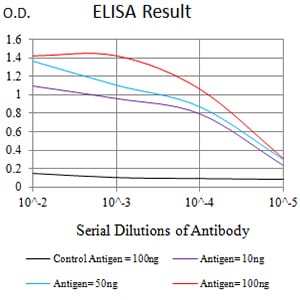
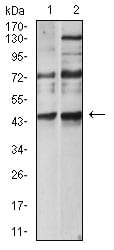
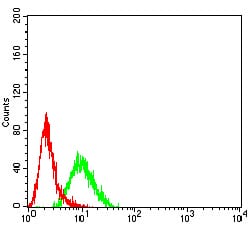
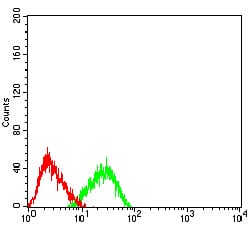
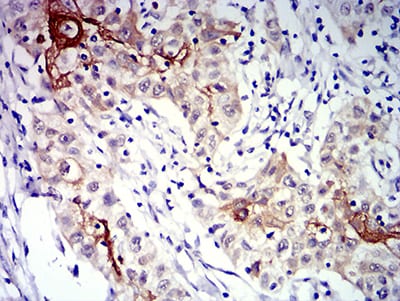
| WB | 1/500 - 1/2000 | Human,Mouse,Rat |
| IF | 咨询技术 | Human,Mouse,Rat |
| IHC | 1/200 - 1/1000 | Human,Mouse,Rat |
| ICC | 技术咨询 | Human,Mouse,Rat |
| FCM | 1/200 - 1/400 | Human,Mouse,Rat |
| Elisa | 1/10000 | Human,Mouse,Rat |
| Aliases | CXCR3; GPR9; MigR; CD182; Mig-R; CKR-L2; CMKAR3; IP10-R |
| Entrez GeneID | 2833 |
| clone | 5C10B3 |
| WB Predicted band size | 40.7kDa |
| Host/Isotype | Mouse IgG1 |
| Antibody Type | Primary antibody |
| Storage | Store at 4°C short term. Aliquot and store at -20°C long term. Avoid freeze/thaw cycles. |
| Species Reactivity | Human |
| Immunogen | Purified recombinant fragment of human CD183 (AA: extra mix) expressed in E. Coli. |
| Formulation | Purified antibody in PBS with 0.05% sodium azide |
+ +
以下是3-4篇关于CD183(CXCR3)抗体的参考文献及其摘要内容:
---
1. **文献名称**:*Differential expression of chemokine receptors and chemotactic responsiveness of type 1 T helper cells (Th1s) and Th2s*
**作者**:Bonecchi R, et al.
**摘要**:该研究揭示了Th1和Th2细胞中趋化因子受体的差异表达,发现CXCR3(CD183)在Th1细胞中特异性高表达,并介导其向炎症部位的迁移,为理解T细胞亚群功能分化提供了关键机制。
2. **文献名称**:*CXCR3 ligands: redundant, collaborative and antagonistic functions*
**作者**:Groom JR, Luster AD
**摘要**:本文综述了CXCR3的配体(如CXCL9/10/11)在炎症和自身免疫中的协同与拮抗作用,强调CXCR3抗体在抑制T细胞介导的疾病(如类风湿性关节炎和多发性硬化症)中的潜在治疗价值。
3. **文献名称**:*CXCR3-mediated antitumor immunity by NK and T cells in a melanoma tumor model*
**作者**:Dufour JH, et al.
**摘要**:通过黑色素瘤模型研究,发现CXCR3抗体阻断可抑制肿瘤细胞迁移和转移,证明CXCR3信号通路在肿瘤微环境中调控免疫细胞(NK细胞、T细胞)浸润的关键作用。
4. **文献名称**:*CXCR3 and hepatitis C virus infection: recruitment of inflammatory T cells and viral escape mechanisms*
**作者**:Apolloni E, et al.
**摘要**:研究揭示了丙型肝炎病毒(HCV)感染中CXCR3+ T细胞向肝脏聚集的机制,并探讨病毒如何通过调控CXCR3配体表达逃避免疫攻击,为抗病毒治疗提供新靶点。
---
以上文献均聚焦于CXCR3(CD183)在免疫调控、疾病机制及治疗中的应用,涵盖基础研究与临床前模型。如需具体文章来源,可通过PubMed或Web of Science按标题/作者进一步检索。
CD183 antibody targets the C-X-C chemokine receptor type 3 (CXCR3), a G protein-coupled receptor primarily expressed on activated T lymphocytes, natural killer (NK) cells, and some B cells. CXCR3 binds chemokines CXCL9. CXCL10. and CXCL11. which are induced by interferon-gamma (IFN-γ) during inflammatory responses. This receptor plays a critical role in directing the migration of Th1-polarized T cells to sites of inflammation, infection, or tissue injury.
CD183 (CXCR3) is implicated in autoimmune diseases (e.g., rheumatoid arthritis, multiple sclerosis), viral infections, and tumor immunology. Antibodies against CD183 are widely used in research to identify and isolate CXCR3-expressing immune cells, study T-cell trafficking, and assess disease mechanisms. Specific CD183 antibody clones (e.g., clone 1C6. 49801) enable applications like flow cytometry, immunohistochemistry, and Western blotting.
Therapeutic targeting of CXCR3 is under investigation, as blocking this receptor may modulate pathological immune responses. However, its dual role in promoting both pro-inflammatory and regulatory T-cell functions complicates clinical translation. CD183 antibodies thus remain vital tools for dissecting immune cell behavior and developing biomarkers for inflammatory or oncological conditions.
×